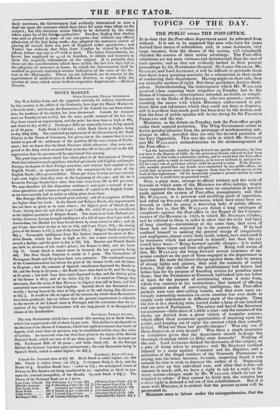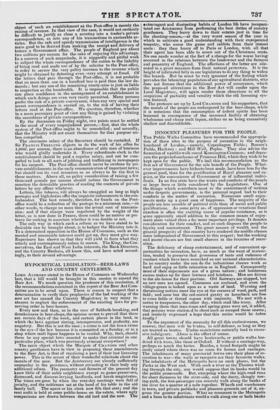TOPICS OF THE DAY.
THE PUBLIC versus THE POST-OFFICE.
IT is clear that the Post-office department must be reformed from without. It is not to be supposed that men who have for years derived their means of subsistence, and, in some instances, very large incomes, from the abuses of the system, will voluntarily abandon the sources of their undue advantage. The Post-office subalterns are not more virtuous and disinterested than the rest of their species ; and as they are evidently backed in their present proceedings by the Postmaster-General, Sir J AMES GRAHAM, Mr. STANLEY, and Lord ALTHORP, it will be difficult to persuade them that there is any pressing necessity for a reformation in their mode of conducting their department. Having might on their side, they are naturally careless of right. But these gentlemen deceive them- selves. Notwithstanding the interruptions which Mr. WALLACE received when exposing their iniquities on Tuesday last in the House of Commons,—interruptions intended, no doubt, as compli- mentary to the Duke of RICHMOND, who was present,—notwith- standing the sneers with which Ministers endeavoured to put down facts and inferences which they could not deny or disprove, still it is evident that much good has been done by the motion, and that the force of public opinion will be too strong for Sir FRANCIS FREELING and the rest.
Ministers, in the debate on Tuesday, took the Post-office people under their especial protection. The Whig Government seems to derive peculiar pleasure from the patronage of misdemeaning sub- alterns in office, provided they are only the devoted partisans of the Tory Opposition. This was the style in which Mr. STANLEY met Mr. WALLACE'S animadversions on the mismanagement of the Post-office- " Let the honourable member bring forward any specific grievance ; let him not turn to the Reports of 1828, for the grievances therein referred to had been redressed ; let him make a substantive motion, and be would find the Post-office department quite as ready to court inquiry, as he was to institute it, and give re- lief for every case of grievance whirls could be proved to exist. If the honour- able member proved that any frauds were committed by any public officer, he would find no person more ready to suppress them than the noble person at the head of that department. Of the honourable member's present motion he must complain, for it could have no practical result."
Now, a plain man, strange to official trickery and the style of bravado in which some of the Ministers too often indulge, might have supposed from this that there were no complaints at present made against the system of Post-office management; and that Mr. WALLACE, in a perverse and meddling spirit of opposition, had raked up five-year-old grievances, which have since been re- dressed, in order to annoy a deserving body of public officers. But the fact is, that Mr. WALLACE found a long catalogue of complaints against the Post-office in the Report of the Commis- sioners of the Revenue in 1828, to which Mr. STANLEY alludes; and he referred to them in order to show that the evils had been of long standing—maintaining at the same time, that most of them had not been removed up to the present day. If he had confined himself to making the general charge of irregularity and negligence, almost every body could, indeed, have confirmed it by instances which had occurred to himself; but then the cry. would have been—" 13ring forward specific charges ; it is unfair to make these vague and loose allegations." Being well aware of this, Mr. WALLACE did bring forward several instances of im- proper conduct on the part of those engaged in the department in question. He made the direct charge against them, that by means of strong lights and glasses, they read the contents of sealed letters; that the solicitor of the establishment had letters laid before him for the purpose of founding actions for penalties upon them; that the Postmaster at Greenock had looked into one letter at least, 'for the purpose of ascertaining where it came from, which was contrary to his instructions ; that instead of offering the speediest modes of conveying intelligence, the Post-office packets were very slow-sailing vessels, and that even upon ex- tremely interesting occasions no extra exertion was ever made to supply early information to different parts of the empire. Then the law is in a shocking state, buried under a heap of one hundred and one acts of Parliament. The salary and fees of the Secretary are enormous—little short of 5,0001. a year : and the incomes of the clerks are derived from a great variety of irregular sources, which afford them numerous opportunities of imposing upon the public, and keeping out of sight the amount which they actually pocket. What are these but specific a ? Was any one of them disproved, or even denied? Was there a single assurance or intimation given that the department. should undergo the thorough cleansing which its filthy state demands? Nothing of the sort. Lord ALTHORP shirked the discussion of the subject, on a plea of being taken by surprise ; and Mr. STANLEY confined himself to a sneer against COBBETT and his Register, and a palliation of the illegal conduct of the Greenock Postmaster in prying into the letter, because, forsooth, suspecting fraud, it was natural for him to wish to discover the author of it. Supposing that we give up this individual case, and allow that it does not amount to much, still, we have a right to ask for a reply to the many serious charges made by Mr. WALLACE, which no one at- tempted to refute: if they cannot be fairly met, the country has a clear right to demand a reform of this establishment. But if it rests with Ministers, it is evident that the present system will be persevered in. Ministers seem to labour under the misapprehension, that the object of such an establishment as the Post-office is merely the raising of revenue. In that view of the case, it would not certainly be difficult to justify as close a scrutiny into a trader's private correspondence, as into any of his transactions in exciseable ar- ticles. But the safe and speedy transmission of intelligence is the main good to be derived from making the receipt and delivery of letters a Government affair. The people of England pay about two millions per annum for the sake of enjoying this advantage. In a concern of such magnitude, it is niggardly and pitiful work to subject the whole correspondence of the nation to the liability of being read and made use of by the solicitor to the Post-office, in order to secure the very paltry increase to the revenue which might ba obtained by detecting even every attempt at fraud. Of the letters that pass through the Post-office, it is not probable that on more than one in a hundred less is paid than the law de- mands ; but any one of the remaining ninety-nine is just as liable to inspection as the hundredth. It is impossible that the public can place confidence in the management of an establishment in which such doings are even very rarely permitted. Many persons prefer the risk of a private conveyance, when any very special and secret correspondence is carried on, to the risk of having their letters read at the Post-office. We question, therefore, whether in a mere pecuniary point of view any thing is gained by violating the sacredness of private correspondence.
By the discussion on Friday night, two points must be settled in the mind of every unprejudiced person,—first, that the whole system of the Post-office ought to be remodelled ; and secondly, that the Ministry will not exert themselves for that purpose un- less compelled.
The enormous salary of the Secretary should be curtailed. If Sir FRANCIS FREELING objects to do the work of his office for 1,0001. per annum, there is an abundance of able men of business who would gladly undertake it. Every subordinate clerk in the establishment should be paid a regular salary, and not be com- pelled to look to all sorts of jobbing and trafficking in newspapers for his support. The Post-office should never he outdone by pri- vate establishments in the early communication of important news; but should use its vast resources so as always to be the first in these matters. Above all, no paltry consideration of raising a few thousand pounds per annum should induce the Government to sanction the detestable practice of reading the contents of private letters by any officer whatever.
Letters, like tobacco, will always be smuggled as long as high postages and high duties offer the requisite inducements to the con- trabandist. The best remedy, therefore, for frauds on the Post- office would be a reductiou of the postage to a minimum rate,—in other words, to charge no more than the actual cost of transmis- sion; and if that charge were regulated by the weight of the letter, as is now done in France, there could be no motive or pre- tence for seeking to ascertain whether it was double or not. The only way in which such a reform as we have stated to be desirable can be brought about, is to badger the Ministry into it. To a determined opposition in the House of Commons, such as the monied and mercantile interest could get up, they must give way. Experience has shown us that they will yield to force what they utterly and contemptuously refuse to reason. The King, the Con- servatives, the East and West India interests, the Bank Directors, and the Country Bankers, all know this, and have acted accord- ingly, to their several advantage.

























 Previous page
Previous page